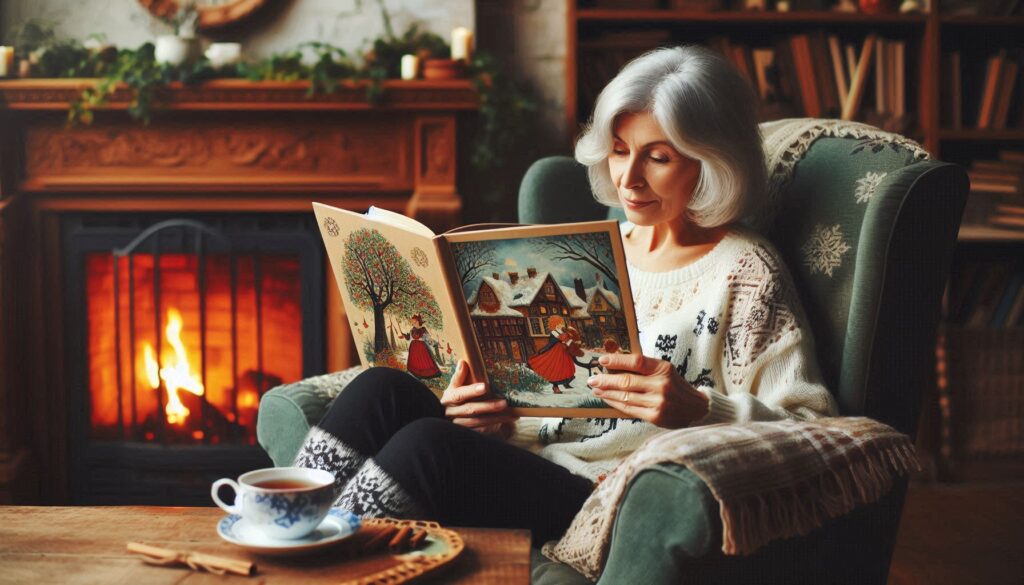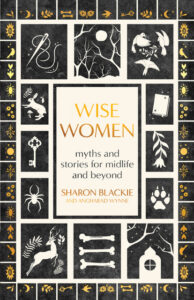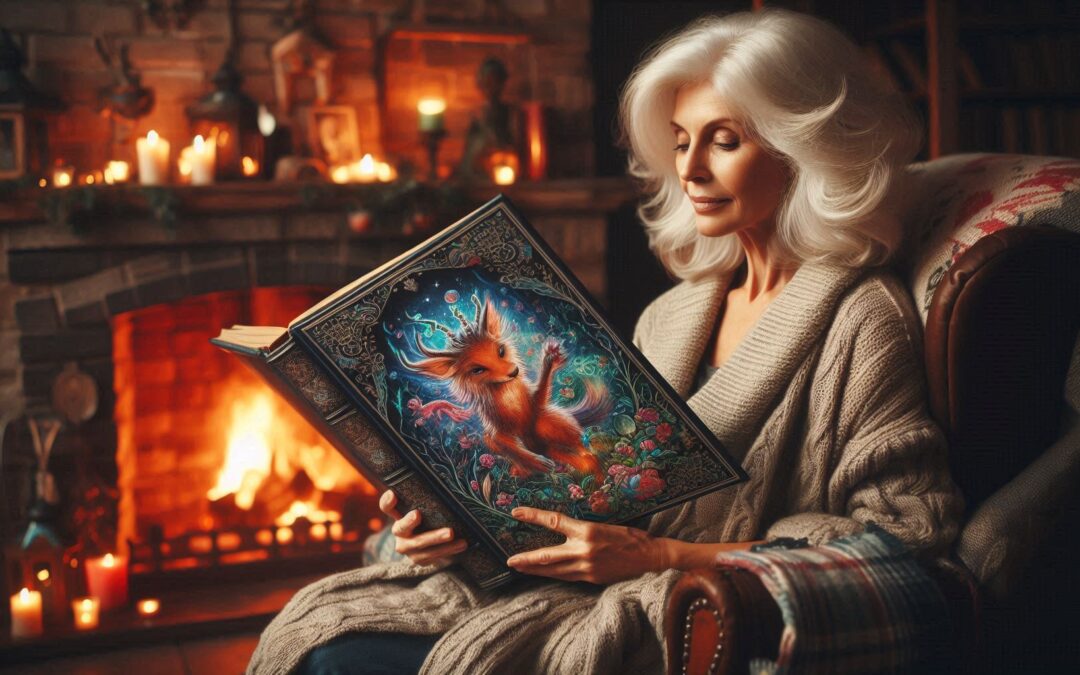Sharon Blackie, PhD, is an award-winning author and psychologist. Her acclaimed books, lectures, and teaching programs are focused on reimagining women’s stories and on the relevance of myths, fairy tales, and folk traditions to the personal, cultural, and environmental problems we face today. A Fellow of the Royal Society of Arts and online faculty for Pacifica Graduate Institute, Sharon lives in Cumbria, England. More information at SharonBlackie.net.
Why did you write Wise Women?
As I stood on the threshold of menopause just over a decade ago, all the signposts seemed to be pointing in the direction of an end to my useful life. That’s what the culture tells us, anyway. The good bits of my story were supposed to be over and now was the time to resign myself to its long, grey ending. I wasn’t having any of that; I’m a psychologist who believes that the essence of life is transformation. The outward-focused narrative of the first half of my life might be drawing to a close, but I was looking for a new narrative to illuminate the second half. I was determined that this ‘ending’ would be followed by a new beginning. And so, though no longer your typical fairy-tale heroine, I set out on a quest through the dark woods of European folklore to look for stories about women like me: older women who refused to be redundant and irrelevant, and who were searching for ways to reimagine the second half of their lives.
During over five years of obsessive research, ever-growing piles of musty, beautifully illustrated old fairy-tale collections and folklore monographs tottered precariously on my desk while I searched through them for lost and hidden gems. Much to my delight, I unearthed a surprising number of stories populated by old women who hold the protagonist’s fate in the palm of their gnarly old hands, who see the bigger picture (and probably were the ones who painted it in the first place), or who have the last laugh. My last book, Hagitude, was focused on the distinctive archetypal characteristics of some of these women, but I didn’t have room in it to tell their stories in full, or to write about the entire, lavish array of enchanting elder women I’d discovered, right here in my own European tradition. So the motivation for this book was, by gathering this folklore together for the first time, to bring back to life the funny and feisty ageing women who have been so thoroughly forgotten. My hope is that this rich and diverse collection of characters will offer insight into the ways that each of us could uniquely embody a bold and purposeful elderhood.
How might we work with the stories of the little-known but powerful women in myth and folklore who are at midlife and beyond – both to inspire us to create new stories of our own, and to reimagine our journey to and through the second half of life?
Stories matter because the ways in which we think about growing older depend on the stories we tell about it. How we think about ageing women depends on the images we hold of them. And the images we hold of women from midlife onwards today aren’t healthy. Truth is, there is no clear image of how to thrive in the second half of life in the contemporary cultural mythology of the West. Older women are mostly ignored, encouraged to be inconspicuous, or held up as objects of derision and satire. But European mythology and folklore tell us something very much more interesting: that it hasn’t always been so.
Myths and folk tales help us not only to understand life as it is, or was – but to dream life as it ought to be. We perceive, explain and make sense of the world through stories. They are the stars we navigate by, and that’s why storytelling is a universal human phenomenon, a vital aspect of communal life across all cultures and throughout the entirety of our known history. Stories teach us everything we know, and their lessons are deep and rich. Stories can reveal to us longings that we never knew we had, fire us up with new ideas and insights, and inspire us to grow and change. The characters in stories are great teachers, too: they are role models for our development, helping us to reimagine ourselves. Helping us to unravel who we are, and to work out who we want to become.
And so, if we turn to old European stories, we find that there exist many different kinds of older women who play pivotal roles in the stories: characters who pull the strings, weave the webs, test or advise the heroes and heroines. They inspire us to find our own meaning and authenticity, and what in Hagitude I called finding our own ‘inner hag’, at a time of our lives when the over-culture tells us we’re largely irrelevant.

What is the nature of older women’s wisdom?
The women in the myths and stories I uncovered are usually presented as wise – though they manifest their wisdom in very different ways. So these stories offer us insight into the diverse nature of older women’s wisdom, and the ways that each of us could uniquely embody it. And so there are some very funny older women, some feisty ones, some actively dangerous ones, some happy and grateful ones. There are ungainly giantesses, glamorous fairy godmothers, misunderstood witches, fierce grandmothers and perspicacious wise women. So what these stories tell us is that there are many, many ways to be wise, and it’s down to each of us to unearth our own inner wise woman: one who reflects our own unique gifts and delights.
Why do older women matter? What do they have to offer in today’s challenged and challenging world?
In our more distant past, as of course in many indigenous cultures today, female elders were respected, and had important and meaningful roles to play. They are the ones who hold the myths and the wisdom stories; the ones who know where the medicine plants grow and what their uses are. They serve as guides for younger adults; they’re the caregivers and mentors for the community’s children. They know when the community is going to the dogs, and they’re not afraid to speak out and say so. When they do, they’re listened to. Their focus is on giving back – on bringing out, for the sake of Earth and community, the hard-earned wisdom which they’ve grown within themselves.
It has to be said, too, that there are a lot of ageing women out there. Between 1918 and 2018, average life expectancy increased by around twenty-five to thirty years in the United States and other developed countries of the world. In most of those countries, women also live on average four or five years longer than men. The elderly – by most societal definitions, adults aged sixty and older – are now the fastest-growing segment of most Western populations, and a majority of them are women.
It’s important for us as older women to think carefully about what we should do with those extra years of life. How should we choose to spend them, in this culture which offers few inspiring role models, and no well-trodden paths for us to follow? Because in contemporary Western society, to be at midlife, or menopausal, or older is rarely to be thought of as gifted and wise. We see the second half of our lives as a time of loss, of decay. That narrative needs to change, so that women in the second half of their lives can be beacons of strength and wisdom again.
What are the conversations about midlife, menopause and beyond that you think we should be having right now?
We should be looking for opportunities, rather than for endings. Although more women are now beginning to write about menopause as a natural and profoundly transformational life-passage, for example, in the culture at large it is still primarily viewed as something to be managed, held off, even fought. Well, you can either see menopause as a possible ending or you can see it as a possible beginning. Arguably, it should be a bit of both. The ending of one phase of life, but also the beginning of a whole new journey – a challenging but ultimately fertile journey across the threshold of elderhood.
Ever since the ground-breaking work of Carl Jung in the first half of the twentieth century, most depth psychologists have argued that the journey through the second half of life is a spiritual passage above all, and that the purpose of this time of our lives is to grow into the person that we were always meant to become. I believe that our journey through the second half of life reveals to us our most authentic self, and offers up a journey that, while challenging, is filled with meaning and purpose.
Wise Women:
Myths and Stories for Midlife and Beyond
By Sharon Blackie and Angharad Wynne
Category: Mythology / Women’s Interest
Pub Date: October 8, 2024
Price: $19.95 * Format: Trade Paperback * Pages: 336
ISBN: 978-1-60868-966-8





